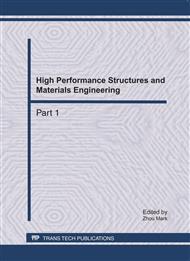[1]
A. C. Yao, Protocols for secure computations, in Proc. 23rd Annual Symp. Foundations of Computer Science, pp.160-164, IEEE Press, New York. (1982).
Google Scholar
[2]
R. Cramer, I. Damgård, S. Dziembowski, M. Hirt, and T. Rabin, Efficient Multiparty Computations Secure against an Adaptive Adversary, in Proc. Advances in Cryptology – EUROCRYPT '99, LNCS 1592, pp.311-326, Springer-Verlag, Berlin/New York. (1999).
DOI: 10.1007/3-540-48910-x_22
Google Scholar
[3]
K. Srinathan, and C. P. Rangan, Efficient Asynchronous Secure Multiparty Distributed Computation, in Proc. INDOCRYPT 2000, LNCS 1977, pp.117-129, Springer-Verlag, Berlin/New York. (2000).
DOI: 10.1007/3-540-44495-5_11
Google Scholar
[4]
R. Cramer, I. Damgård, and U. Maurer, General Secure Multi-party Computation from any Linear Secret-sharing Scheme, in Proc. Advances in Cryptology – EUROCRYPT 2000, LNCS 1807, pp.316-334, Springer-Verlag, Berlin/New York. (2000).
DOI: 10.1007/3-540-45539-6_22
Google Scholar
[5]
M. Hirt, U. Maurer, and B. Przydatek, Efficient Secure Multi-party Computation, in Proc. Advances in Cryptology – ASIACRYPT 2000, LNCS 1976, pp.143-161, Springer-Verlag, Berlin/New York. (2000).
DOI: 10.1007/3-540-44448-3_12
Google Scholar
[6]
W. Du, and M. Atallah, Secure Multi-Party Computation Problems and Their Applications: A Review and Open Problems, in Proc. New Security Paradigms Workshop, pp.11-20, ACM Press, New York. (2001).
DOI: 10.1145/508171.508174
Google Scholar
[7]
R. Cramer, S. Fehr, Y. Ishai, and E. Kushilevitz, Efficient Multi-party Computation over Rings, in Proc. Advances in Cryptology – EUROCRYPT 2003, LNCS 2656, pp.596-613, Springer-Verlag, Berlin/New York. (2003).
DOI: 10.1007/3-540-39200-9_37
Google Scholar
[8]
P. Feldman, A Practical Scheme for Non-Interactive Verifiable Secret Sharing, in Proc. 28th Annual Symp. Foundations of Computer Science, pp.427-437, IEEE Press, New York. (1987).
DOI: 10.1109/sfcs.1987.4
Google Scholar
[9]
R. Gennaro, and M. Di Raimondo, Secure Multiplication of Shared Secrets in the Exponent, Information Processing Letters, vol. 96, pp.71-79. (2005).
DOI: 10.1016/j.ipl.2005.01.015
Google Scholar
[10]
M. Abe, Robust Distributed Multiplication without Interaction, in Proc. Advances in Cryptology – CRYPTO '99, LNCS 1666, pp.130-147, Springer-Verlag, Berlin/New York. (2000).
DOI: 10.1007/3-540-48405-1_9
Google Scholar
[11]
T. P. Pedersen, Non-Interactive and Information-Theoretic Secure Verifiable Secret Sharing, in Proc. Advances in Cryptology – CRYPTO '91, LNCS 576, pp.129-140, Springer-Verlag, Berlin/New York. (1992).
DOI: 10.1007/3-540-46766-1_9
Google Scholar
[12]
R. Gennaro, S. Jarecki, H. Krawczyk, and T. Rabin, Robust Threshold DSS Signatures, Information and Computation, vol. 164, no. 1, pp.54-84. An earlier version appeared in Eurocrypt '96. (2001).
DOI: 10.1006/inco.2000.2881
Google Scholar
[13]
L. R. Welch, and E. R. Berlekamp, Error Correction of Algebraic Block Codes, U. S. Patent 4 633 470. (1983).
Google Scholar
[14]
C. Peikert, On Error Correction in the Exponent, in Proc. Theory of Cryptography Conference (TCC 2006), LNCS 3876, pp.167-183, Springer-Verlag, Berlin/New York. (2006).
Google Scholar
[15]
A. Herzberg, S. Jarecki, H. Krawczyk, and M. Yung, Proactive Secret Sharing or: How to Cope with Perpetual Leakage, in Proc. Advances in Cryptology – CRYPTO '95, LNCS 963, pp.339-352, Springer-Verlag, Berlin/New York. (1995).
DOI: 10.1007/3-540-44750-4_27
Google Scholar
[16]
T. Pedersen, A Threshold Cryptosystem without a Trusted Party, in Proc. Advances in Cryptology – EUROCRYPT '91, LNCS 547, pp.522-526, Springer-Verlag, Berlin/New York. (1991).
DOI: 10.1007/3-540-46416-6_47
Google Scholar
[17]
R. Gennaro, S. Jarecki, H. Krawczyk, and T. Rabin, Secure Distributed Key Generation for Discrete-log Based Cryptosystems, in Proc. Advances in Cryptology – EUROCRYPT '99, LNCS 1592, pp.295-310, Springer-Verlag, Berlin/New York. (1999).
DOI: 10.1007/3-540-48910-x_21
Google Scholar
[18]
R. Canetti, Security and Composition of Multi-party Cryptographic Protocols, Journal of Cryptology, vol. 13, no. 1, pp.143-202. (2000).
DOI: 10.1007/s001459910006
Google Scholar
[19]
H. Wang, Y. Q. Zhang, and D. G. Feng, Short Threshold Signature Schemes without Random Oracles, in Proc. Progress in Cryptology – INDOCRYPT 2005, LNCS 3797, pp.297-310, Springer-Verlag, Berlin/New York. (2005).
DOI: 10.1007/11596219_24
Google Scholar
[20]
E. Modiano, and A. Ephremides, Communication Protocols for Secure Distributed Computation of Binary Functions, Information and Computation, vol. 158, no. 2, pp.71-97. (2000).
DOI: 10.1006/inco.2000.2865
Google Scholar


